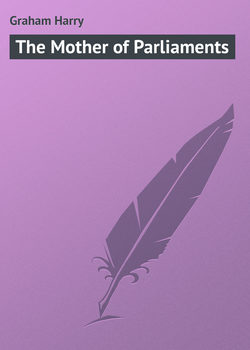The Mother of Parliaments

Реклама. ООО «ЛитРес», ИНН: 7719571260.
Оглавление
Graham Harry. The Mother of Parliaments
PREFACE
CHAPTER I. PARLIAMENT AND PARTY
CHAPTER II. THE HOUSE OF LORDS
CHAPTER III. THE HOUSE OF COMMONS
CHAPTER IV. THE PALACE OF WESTMINSTER
CHAPTER V. HIS MAJESTY'S SERVANTS
CHAPTER VI. THE LORD CHANCELLOR
CHAPTER VII. THE SPEAKER
CHAPTER VIII. THE OPENING OF PARLIAMENT
CHAPTER IX. RULES OF DEBATE
CHAPTER X. PARLIAMENTARY PRIVILEGE AND PUNISHMENT
CHAPTER XI. PARLIAMENTARY DRESS AND DEPORTMENT
CHAPTER XII. PARLIAMENTARY ELOQUENCE
CHAPTER XIII. PARLIAMENT AT WORK – (1)
CHAPTER XIV. PARLIAMENT AT WORK (II)
CHAPTER XV. STRANGERS IN PARLIAMENT
CHAPTER XVI. PARLIAMENTARY REPORTING
Отрывок из книги
It has been asserted that the different social conditions of various peoples have their origin, not so much in climate or parentage, as in the character of their governments. If that be true, there is little doubt that the social conditions of England should compare most favourably with those of sister nations. But the admirable form of Government to which Englishmen have now long been accustomed, did not come into existence in the course of a single night. "The resemblance between the present Constitution and that from which it originally sprang," says an eighteenth-century writer, "is not much nearer than that between the most beautiful fly and the abject worm from which it arose."1 And the conversion of the chrysalis into the butterfly has been a slow and troublesome process.
Montesquieu, who was an earnest student of the English Constitution, after reading the treatise of Tacitus on the manners of the early Germans, declared that it was from them that England had borrowed her idea of political government. Whether or no this "beautiful system was first invented in the woods,"2 as he says, it is certain that we owe the primary principles of our existing constitution to German sources. They date back to the earliest days of the first settlements of Teutons on the Kentish shores.
.....
Bribery no longer emanated direct from the Crown, but was practised vicariously by the King through his ministers. They might object to the system, but, as King William once said to Bishop Burnet, they had to do with "a set of men who must be managed in this vile way or not at all."17 Macaulay likens the Parliament of that time to a pump which, though it may appear dry, will, if a little water is poured into it, produce a great flow. So, he says, £10,000 given in bribes to Parliament would often produce a million in supplies.18 Even Pelham, a man of unblemished reputation in private life, saw the absolute necessity of distributing bribes right and left. And in 1782 we find Lord North writing to George III. to remind him that "the last general election cost near £50,000 to the Crown, beyond which expense there was a pension of £1000 a year to Lord Montacute and £500 a year to Mr. Selwyn for their interest at Midhurst and Luggershall."19
Seats in Parliament were regularly bought and sold, the price varying from £1500 to as much as £7000. Flood, the Irish politician, purchased a seat in the English House of Commons for £4000. The notoriously corrupt borough of Gatton was publicly advertised for sale in 1792, with the power of nominating two representatives for ever, described by the auctioneer as "an elegant contingency."20 This same seat was sold in 1831 by Sir Mark Wood for the huge sum of £60,000, and the purchaser's feelings may well be imagined when, under the Reform Act of the following year, the borough was disfranchised and rendered worthless.21
.....